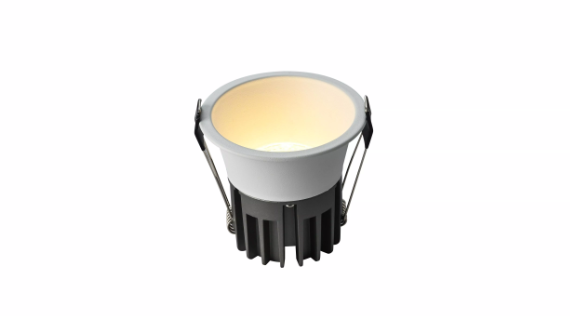Views: 0 Author: Site Editor Publish Time: 2025-06-18 Origin: Site









Are your lights too dim or too harsh? Choosing the right one can change your whole space. Downlights and spotlights are two popular lighting types. But they work very differently. So, which is better, downlight or spotlight? That depends on your needs.
In this post, you’ll learn what makes each light unique, and how to pick the best one for your room.
A downlight is a type of light fixture that’s installed into the ceiling. It shines light straight down. It’s designed to spread light across a wide area. That makes it perfect for general lighting.
Downlights are almost invisible in a room. Only the rim or “trim” is seen. So, they’re great for clean, modern interiors. Here’s how they work: electricity powers the LED bulb inside the fixture, which then pushes light downward in a wide beam. They usually come in LED format because it's long-lasting and energy-efficient.
| Type | What Makes It Special | Where It's Used |
|---|---|---|
| Recessed | Hidden in the ceiling | Kitchens, living rooms |
| Surface-mounted | Visible on the ceiling surface | Where recessing isn’t possible |
| Fire-rated | Prevents fire from spreading | Ceilings with fire codes |
| Smart | Can be app or voice controlled | Smart homes |
| Adjustable head | Lets you tilt the beam | Accent areas, displays |

A spotlight is a directional light that sends a narrow beam onto a specific spot. It’s not made to light up an entire room. Instead, it focuses on a smaller area. That’s why it’s used to highlight things like artwork, photos, or architectural features. The bulb is usually mounted in a frame that you can turn or tilt. This gives you total control over where the light goes.
| Type | Key Feature | Best For |
|---|---|---|
| Fixed | Beam can’t move | Simple displays |
| Adjustable | Head can rotate or tilt | Flexible lighting needs |
| Track-mounted | Several lights on one track | Galleries, kitchens |
| GU10 | Replaceable bulb | Budget-friendly setups |
| Integrated LED | Built-in LED, no bulb change | Long-term savings |

Downlights have a wide beam angle, usually between 60° to 120°. This gives them a soft, full-room glow. Spotlights use narrow beams, from 15° to 45°, to light up one object or space.
| Feature | Downlight | Spotlight |
|---|---|---|
| Beam angle | Wide | Narrow |
| Light spread | General area | Focused spot |
| Use | Ambient light | Accent or task light |
Downlights are sleek. They blend into the ceiling and barely get noticed. Minimalist homes love this. Spotlights stand out more. You see the fixture, and sometimes that’s the point. They add style and drama. Want a clean ceiling? Choose downlights. Want a bold look or an art gallery vibe? Try spotlights.
Once you install a downlight, it points straight down. That’s it. Spotlights? You can move them. Aim them at a wall, art piece, shelf—wherever you want. This makes spotlights more flexible. You can change your lighting focus anytime.
Downlights need cutout holes in your ceiling. You also need enough space above the ceiling to house the fixture. Spotlights don’t always need holes. Many mount on surfaces or tracks, so they’re easier for homes with concrete ceilings or little space.
| Requirement | Downlight | Spotlight |
|---|---|---|
| Ceiling cutout | Needed | Not always |
| Space above ceiling | Yes | Minimal |
| Installation complexity | Moderate | Easier |
Both options use LED, which saves energy and lasts long. However, integrated LED spotlights tend to have a longer life than GU10 spotlight bulbs, which you may have to replace. Downlights with built-in LEDs also last longer but need full replacement if they fail. So, in both cases: built-in = long life but harder to fix, while bulb-based = easier to maintain.
Need soft, even light for daily life? Go with downlights. Want a dramatic glow on your painting or bookshelf? Spotlights are perfect. Downlights give a peaceful, balanced feel. Spotlights create drama, texture, and mood. Combining both types creates layered lighting, which designers use to build depth.
Spotlights get warmer. That means you shouldn’t place them near fabrics or flammable objects.
Downlights run cooler—especially LED models—but need fire-rated designs if installed in areas with building safety codes.
Always check for IP ratings in wet spaces like bathrooms.
Downlights give wide, soft lighting for general use. Spotlights focus on specific spots and create visual drama. So, which is better, downlight or spotlight? It depends on your space, tasks, and design style. Use downlights for overall lighting. Use spotlights for accents or tasks. Or, combine both for layered results. Still unsure? Talk to a lighting expert. They’ll help you design the perfect lighting for your home.
A: Yes, combining both provides layered lighting, balancing general illumination and focused accents for better effect.
A: Both are efficient when using LEDs, but integrated LED models often offer better long-term energy savings.
A: Some use replaceable GU10 bulbs, while others have built-in LEDs. Check your fixture type before buying.
A: Generally yes. Downlights emit less heat, while spotlights may pose fire risks near flammable materials.
A: LED downlights and integrated spotlights last 25,000–50,000 hours. GU10 bulbs may need earlier replacement.